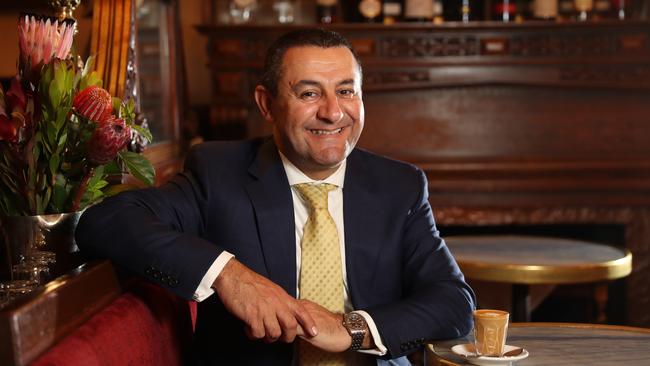Super fund calls for RBA stress test amid fears of $50bn coronavirus raid
Hostplus CEO calls for RBA ‘scenario modelling’ of the impact of the government’s proposed early release scheme for super.

The chief executive of the Hostplus superannuation fund, David Elia, has called on the Reserve Bank to do “scenario modelling” of the impact of the government’s proposed early release scheme for super, amid concern the withdrawals could be as high as $50bn.
Mr Elia’s call comes amid sharp differences between Treasury estimates that the scheme, which will allow workers to draw down $20,000 from their super over the next few months, would see a draw-down of some $27bn, and industry concerns that it could be as high as $50bn.
It comes at a time when super fund contributions are also falling, with an increasing number of people now out of work and funds’ earnings hit by a collapse of sharemarkets.
The first signs of how much will be withdrawn under the federal government’s scheme are expected to come next week, when workers can approach the Australian Taxation Office to apply.
Mr Elia called on the RBA, which has its monthly board meeting on Tuesday, to estimate the range of options for the draw-down so that the superannuation industry and others could be prepared for the impact on liquidity.
He said this could be done in the context of the RBA’s role as overseer of the stability of the nation’s financial system.
“Many funds, such as Hostplus, have embraced the government’s early release scheme and want to play their role in assisting members during this difficult time,” Mr Elia told The Australian.
“If government estimates of a $27bn draw-down of super by millions of Australians is accurate, the industry will likely experience no liquidity issues.
“If the government is wrong, and the figure is more like $50bn estimated by some actuaries, then there will likely be a need for the RBA to provide some type of liquidity operation,” he said.
Mr Elia said the RBA option needed to be seen in the context that people had never been able to take significant amounts of money out of their super before.
“The superannuation system was never designed with this in mind,” he said. “Trustees of assets have structured their allocations based on known, existing rules.
“It will take some time for funds to readjust to these new arrangements, which were introduced with next to no notice and without consultation.
“The RBA, which is responsible for the financial stability of markets, should be encouraged to conduct further scenario modelling that incorporates varying levels of take-up rates around the early release scheme to determine what, if any, additional planning should be put in place.
“Based on these new government changes, wouldn’t it be prudent for the RBA to simply examine this issue in more detail and ensure that it can continue to support the stability and orderly function of markets, which is in the best interests of every single Australian?”
Mr Elia said Hostplus was also interested in playing a part in assisting recapitalising corporate Australia, as it did in the wake of the global financial crisis.
“An RBA option could provide funds with the confidence to do more, rather than less,” he said.
A sharper than expected draw-down is expected to revive calls across the industry for super funds to have access to liquidity support from the RBA.
While Treasury has estimated that withdrawals could amount to $27bn, actuarial firm Rice Warner warned last week it could be as high as $50bn.
Rice Warner pointed out that the estimates were done by Treasury before the true extent of the unemployment crisis was evident, with an increasing amount of jobs lost to business closures and increasingly strict social-isolation measures.
While the federal government has rejected initial calls for super funds to be able to access RBA liquidity in a similar way to banks, proposed recently, a massive draw-down of funds at a time when the funds are hit by a fall in contributions and a collapse in the value of their share portfolios could put new pressure on the government to ease its stance as applications come in this month.
Mr Elia’s comments come as the chief executive of Australia’s largest super fund, the $170bn AustralianSuper, has also warned that the actual withdrawal figure could be much higher than Treasury’s estimate of $27bn.
The federal government has said that applications by people wanting to withdraw money from their super funds can be made to the ATO from “mid-April”.




To join the conversation, please log in. Don't have an account? Register
Join the conversation, you are commenting as Logout